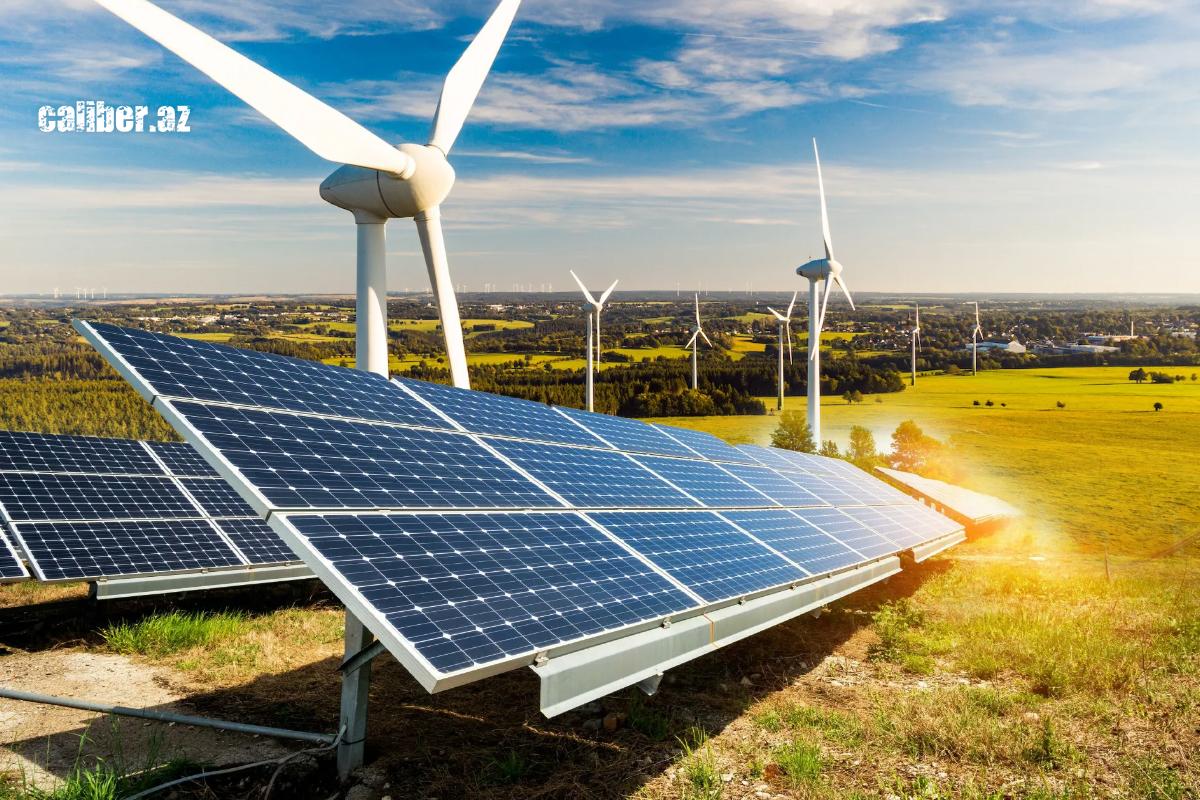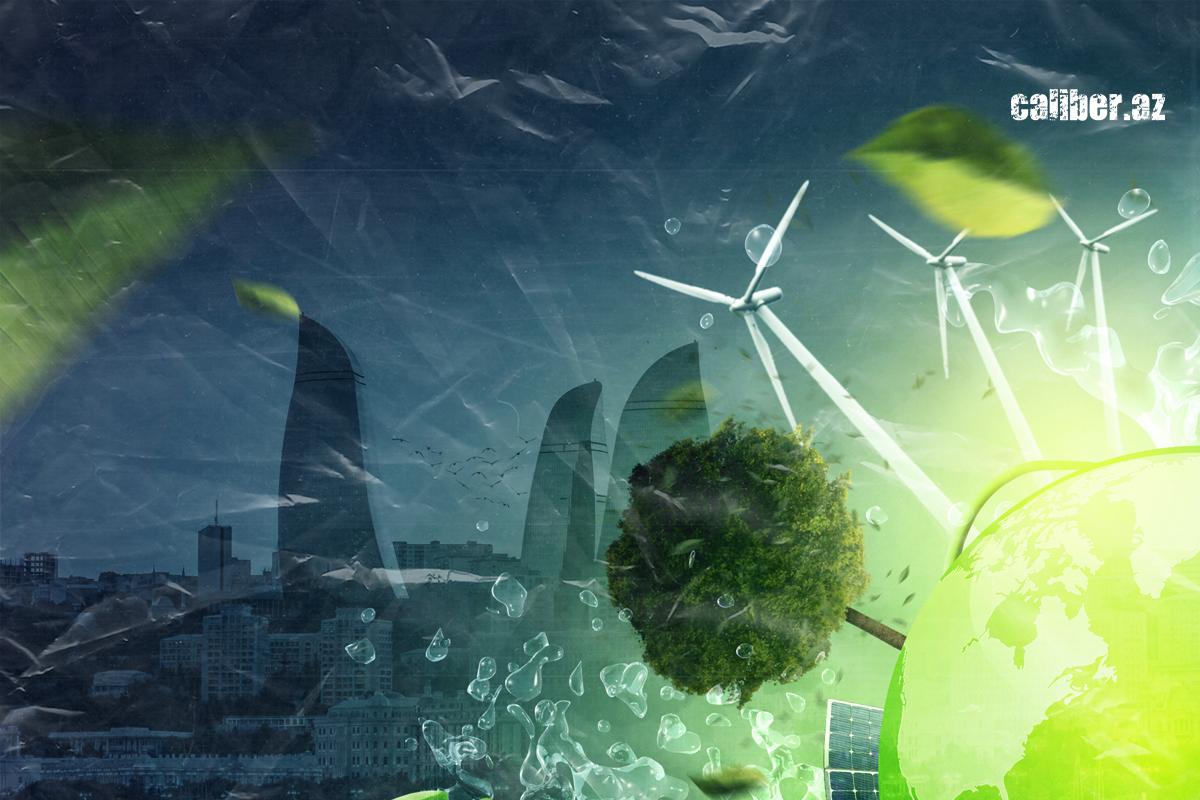Green energy and environment: Azerbaijan's path to decarbonization Analysis by Caliber.Az
Azerbaijan is emerging as a regional leader in the Caspian area in its commitment to the global energy transition by 2030. The country’s focus on the development of "green" energy has led to efforts to attract foreign investors and international donor organizations. This approach, which includes preferential capitalization of projects, not only facilitates the adoption of advanced technologies and expertise but also boosts the professional development of local specialists.
A significant milestone in this transition was the establishment of SOCAR Green LLC about a year ago. The company is expected to play a crucial role in the decarbonization process and the development of renewable energy. Another key initiative in this effort is the launch of the State Oil Company's green bonds, with funds raised earmarked for projects by SOCAR Green.
Azerbaijan boasts significant natural potential for the development of renewable energy sources (RES), and to capitalize on these opportunities, the country has developed a comprehensive state policy and introduced a new legislative framework. This framework includes fiscal incentives and other preferences for investors, alongside the establishment of partnerships with relevant international companies and donor organizations.
According to the Ministry of Energy, by early 2024, the capacity of RES generating facilities within Azerbaijan's energy system was approximately 1,700 MW, accounting for 20% of total energy production. It is projected that, with the construction of eight large-scale solar and wind power plants, the country's energy capacity will increase by an additional 2 GW of "green" energy by the end of 2027. This will elevate the share of RES to 33% of the total generation in the republic. These projects are expected to attract around $2.8 billion in foreign investment.

Moreover, a number of state structures in the country are implementing local projects aimed at decarbonization, energy efficiency, and the introduction of green technologies into production processes, among other initiatives. In particular, by reducing emissions into the atmosphere and implementing modern technologies, the Baku International Sea Trade Port (BISTP) became the first port in the Caspian Sea to receive "green" status and was also included in the list of 30 Green Ports in Europe with the same status. Similar goals are being pursued by the Azerbaijan Caspian Shipping Company (ASCO), through investments in new vessels with energy-efficient systems, modernization, and enhancing the energy efficiency of its fleet, which has led to a 20% reduction in its carbon footprint. Similar trends have been observed in the activities of the Azerbaijan Railways JSC (ADY): the agency actively utilizes the potential of RES, significantly reduced gas and other fuel consumption, and decreased CO2 emissions by 9%.
However, the most consistent efforts on energy efficiency and decarbonization are being carried out by the State Oil Company of Azerbaijan (SOCAR). The company was one of the first in the country to implement energy-saving systems in the petrochemical industry, install wind turbines and solar panels at offshore and other facilities, and launch various low-carbon initiatives.
Notably, during the UN Climate Conference COP28, held in November 2023 in the UAE, SOCAR unveiled its strategic vision to achieve net-zero emissions by 2050 as part of its comprehensive decarbonization action plan. Key targets include achieving zero flaring at all operational assets by 2030, completely eliminating methane emissions in the upstream sector by 2035, and significantly reducing carbon emission intensity by 2030. Overall, SOCAR aims to reduce corporate emission intensity by 30% compared to the baseline year of 2022, with total emissions reduced by 20% by 2035. The long-term goal is to reach net-zero emissions by 2050.

A key step in this direction was the establishment by SOCAR in December 2023 of a new subsidiary, SOCAR Green LLC, which has been tasked with: implementing projects in the field of renewable energy sources (RES), producing "green" hydrogen, carbon capture and storage, and providing assistance in preparing strategic roadmaps for reducing carbon emissions across the country. The company is also responsible for studying advanced international practices in "green" technologies and their implementation, taking into account Azerbaijan's potential and needs.
"SOCAR Green will lead the transformational efforts to diversify our energy portfolio and support Azerbaijan's clean energy ambitions," said SOCAR President Rovshan Najaf, speaking at the forum "SOCAR's Progress in Decarbonization: Challenges and Achievements," organized as part of the COP29 conference in Baku in November last year.
The past year has indeed been significant for the newly established SOCAR Green in accelerating Azerbaijan’s low-carbon initiatives. Specifically, two solar parks in Bilasuvar and Neftchala will be built by a joint venture between the UAE’s Masdar (75%) and SOCAR Green. These projects, with a total investment volume estimated at $670 million, will be co-financed by the European Bank for Reconstruction and Development (EBRD), the Asian Development Bank (ADB), and the Asian Infrastructure Investment Bank (AIIB).
According to a memorandum signed in November of last year between SOCAR Green and Chinese companies China Energy Overseas Investment Co., Ltd. and China Datang Co., Ltd., a project is planned to build a 160 MW solar power station in the Fuzuli region. Joint efforts will also focus on creating integrated smart energy systems and establishing a Research and Development Center in this field in Azerbaijan.
SOCAR Green also holds a memorandum of understanding for the development of geothermal energy projects in Azerbaijan. As part of the collaboration with the largest oilfield services company Schlumberger (SLB), joint studies are planned to explore the geothermal energy potential in the Karabakh region. In 2024, a memorandum was signed between the State Agency for Water Resources of Azerbaijan and SOCAR Green, aimed at improving energy efficiency in the management of the country's water resources and implementing "green" generation projects in this sector.

According to the Director of SOCAR Green, Elmir Musayev, the company's mandate extends far beyond solar and wind energy projects: "We are also actively working on research and development of carbon capture technologies, its utilization and storage, as well as the production of 'green hydrogen.'" As part of the overall national goal for the energy transition, SOCAR is collaborating with BP within the framework of the Climate and Sustainability Lighthouse program, which contributes to the decarbonization of the company's assets. To manage these initiatives, a new segment called "Energy Transition and Environment" has been created.
In total, SOCAR has already developed a renewable energy project portfolio with a total capacity of 1.4 GW. In this direction, SOCAR is collaborating with Total, and a joint project with BP is underway to decarbonize the oil and gas terminal in Baku. Another "green" initiative in SOCAR's activities is the signed cooperation agreement with Saudi company ACWA Power for the potential production and subsequent sale of "green" fertilizers (primarily urea) as part of the "Low-carbon/Green Fertilizers" project.
Given the large-scale agreements signed by SOCAR Green last year and the company's readiness to participate as an equity shareholder in projects aimed at developing the country's RES potential, the issue of financing these initiatives is highly relevant. A key step in this direction is the launch, starting January 15, 2025, of the State Oil Company of Azerbaijan’s "green" bonds. The total volume of the issue will amount to $200 million, with 200,000 bonds, each with a nominal value of $1,000. The bonds will have a five-year maturity, with coupon payments made quarterly, and an annual yield of 6%. The underwriter of the issuance is the investment company PASHA Capital, and the "green" bonds can be purchased at SOCAR Bonds kiosks at "ASAN service" centres No. 1 and No. 5, as well as through investment companies registered in Azerbaijan. The funds raised from the bond issuance will be directed towards financing projects and SOCAR Green’s equity participation in RES initiatives.








